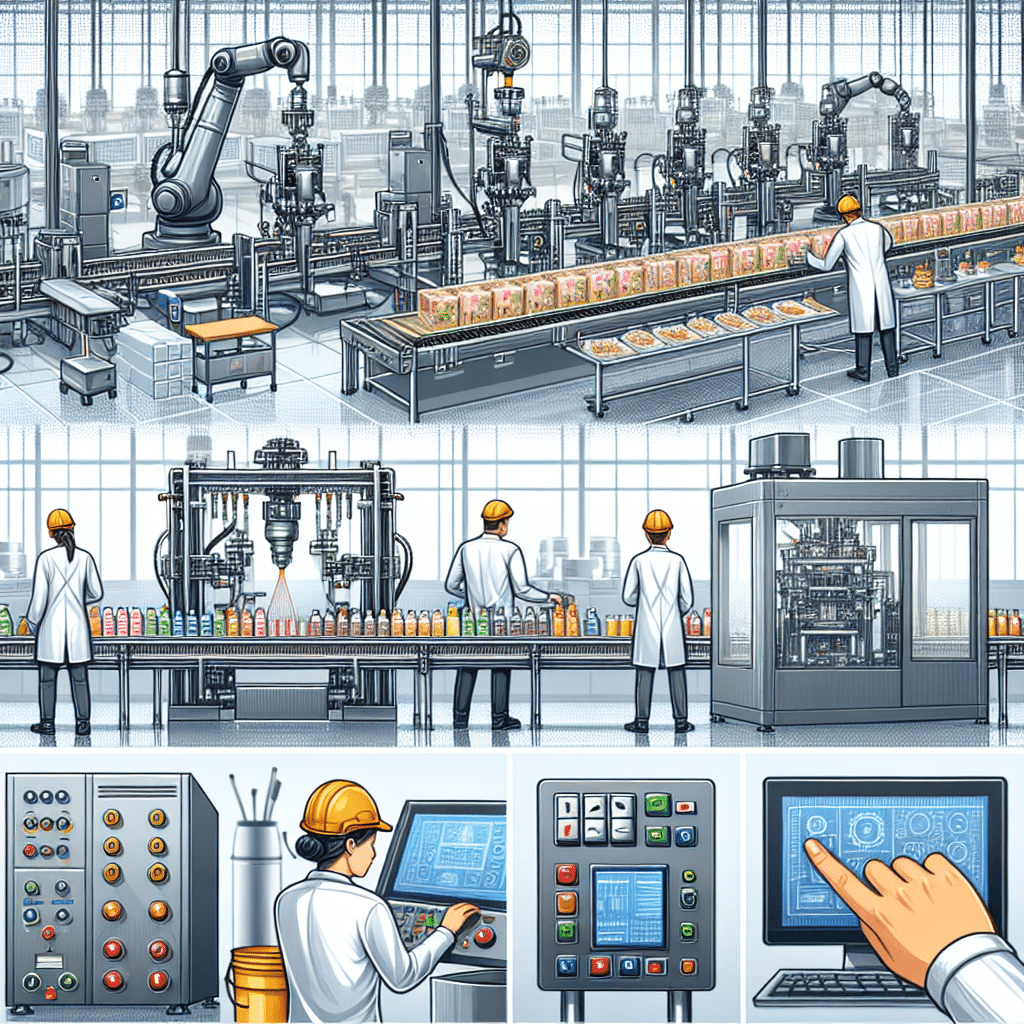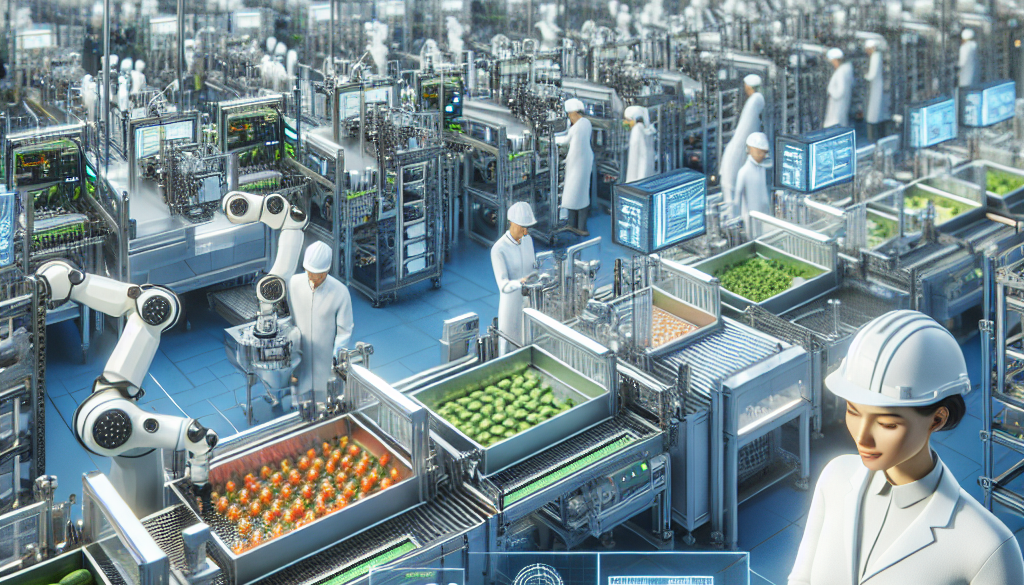Implementing Technological Advancements in Food Industry
-
Table of Contents
- Technological Advancements Revolutionizing the Food Industry
- The Role of Technology in Modern Food Production
- Processing and Packaging Innovations
- Supply Chain Optimization
- Consumer Engagement and Personalization
- Challenges and Considerations
- Conclusion
- ETprotein: Enhancing Nutrition with Advanced Protein Products
Technological Advancements Revolutionizing the Food Industry

The food industry is undergoing a significant transformation, thanks to the integration of cutting-edge technologies. From farm to table, every aspect of food production, processing, distribution, and consumption is being enhanced by technological innovations. These advancements are not only improving efficiency and sustainability but also reshaping consumer experiences and expectations. In this article, we will explore how the food industry is implementing these technologies and the impact they are having on the sector.
The Role of Technology in Modern Food Production
Technology has become an integral part of modern food production, with advancements aimed at increasing yield, improving quality, and reducing environmental impact. Here are some key areas where technology is making a difference:
- Precision Agriculture: GPS technology, drones, and IoT devices are enabling farmers to monitor crop health, optimize water usage, and manage resources more efficiently.
- Biotechnology: Genetic engineering and CRISPR gene editing are helping to develop crops that are more resistant to pests, diseases, and extreme weather conditions.
- Vertical Farming: This innovative approach uses controlled environments and hydroponic systems to grow crops in urban settings, reducing the need for land and transportation.
Processing and Packaging Innovations
Advancements in food processing and packaging are ensuring that food stays fresh longer and is safer for consumption. Some notable innovations include:
- High-Pressure Processing (HPP): This cold pasteurization technique uses high pressure to eliminate pathogens without affecting the food’s taste or nutritional value.
- Smart Packaging: Packaging that incorporates sensors can track a product’s freshness, temperature, and exposure to contaminants, providing real-time data to both suppliers and consumers.
- Edible Packaging: Made from natural, biodegradable materials, edible packaging reduces waste and offers an eco-friendly alternative to traditional plastics.
Supply Chain Optimization
Technology is also revolutionizing the food supply chain, making it more transparent and efficient. Key advancements include:
- Blockchain: By creating a secure and immutable ledger of transactions, blockchain technology ensures traceability and accountability from farm to fork.
- Artificial Intelligence (AI): AI algorithms can predict demand, optimize routes, and manage inventory, reducing waste and improving delivery times.
- Robotics: Automated systems and robots are increasingly being used for picking, packing, and sorting, speeding up the supply chain and reducing labor costs.
Consumer Engagement and Personalization
Technological advancements are not only improving the back-end of the food industry but also enhancing the consumer experience. Here’s how:
- Mobile Apps: Apps allow consumers to track their food’s origin, access nutritional information, and even order groceries or meals with the touch of a button.
- Personalized Nutrition: AI and machine learning are enabling companies to offer personalized dietary recommendations based on individual health data and preferences.
- Augmented Reality (AR): AR applications can provide consumers with interactive experiences, such as virtual cooking classes or exploring the journey of their food from source to plate.
Challenges and Considerations
While the benefits of technology in the food industry are clear, there are also challenges to consider:
- Data Security: With the increased use of digital technologies, protecting sensitive data against cyber threats is paramount.
- Access and Affordability: Ensuring that technological advancements are accessible and affordable to all players in the food industry, including small-scale farmers and producers, is essential for widespread adoption.
- Regulatory Compliance: As new technologies emerge, regulatory frameworks must evolve to ensure food safety and consumer protection.
Conclusion
The implementation of technological advancements in the food industry is creating a more efficient, sustainable, and consumer-friendly future. From precision agriculture to AI-driven supply chains and personalized nutrition, technology is at the forefront of this evolution. As the industry continues to innovate, it is crucial to address challenges such as data security, accessibility, and regulatory compliance to ensure that the benefits of technology can be fully realized.
ETprotein: Enhancing Nutrition with Advanced Protein Products
In line with the technological advancements in the food industry, ETprotein is at the forefront of providing high-quality protein products that cater to the evolving needs of consumers. Their range of organic bulk vegan proteins and L-(+)-Ergothioneine (EGT) products are designed to meet the demands of various industries, including nutraceuticals, pharmaceuticals, and food and beverage.
ETprotein’s commitment to non-GMO, allergen-free, and high-purity ingredients ensures that their products are not only nutritious but also align with the technological strides being made in food production and processing. By choosing ETprotein, companies can be confident in offering consumers the latest in protein innovation.
About ETprotein:
ETprotein, a reputable protein and L-(+)-Ergothioneine (EGT) Chinese factory manufacturer and supplier, is renowned for producing, stocking, exporting, and delivering the highest quality organic bulk vegan proteins and L-(+)-Ergothioneine. They include Organic rice protein, clear rice protein, pea protein, clear pea protein, watermelon seed protein, pumpkin seed protein, sunflower seed protein, mung bean protein, peanut protein, and L-(+)-Ergothioneine EGT Pharmaceutical grade, L-(+)-Ergothioneine EGT food grade, L-(+)-Ergothioneine EGT cosmetic grade, L-(+)-Ergothioneine EGT reference grade and L-(+)-Ergothioneine EGT standard. Their offerings, characterized by a neutral taste, non-GMO, allergen-free attributes, with L-(+)-Ergothioneine purity over 98%, 99%, cater to a diverse range of industries. They serve nutraceutical, pharmaceutical, cosmeceutical, veterinary, as well as food and beverage finished product distributors, traders, and manufacturers across Europe, USA, Canada, Australia, Thailand, Japan, Korea, Brazil, and Chile, among others.
ETprotein specialization includes exporting and delivering tailor-made protein powder and finished nutritional supplements. Their extensive product range covers sectors like Food and Beverage, Sports Nutrition, Weight Management, Dietary Supplements, Health and Wellness Products, and Infant Formula, ensuring comprehensive solutions to meet all your protein needs.
As a trusted company by leading global food and beverage brands and Fortune 500 companies, ETprotein reinforces China’s reputation in the global arena. For more information or to sample their products, please contact them and email sales(at)ETprotein.com today.












